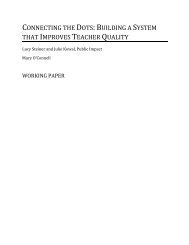Using Competency-Based Evaluation to Drive Teacher Excellence
Using Competency-Based Evaluation to Drive Teacher Excellence
Using Competency-Based Evaluation to Drive Teacher Excellence
You also want an ePaper? Increase the reach of your titles
YUMPU automatically turns print PDFs into web optimized ePapers that Google loves.
figure<br />
<strong>Evaluation</strong> Form in Singapore<br />
<br />
Goals. Specific work goals that include compe -<br />
tency targets and other performance goals for the<br />
next year<br />
Competencies. Current competency ratings<br />
PD plans. Training and development plans for the<br />
next year<br />
Feedback. Reviews and comments by the teacher<br />
and supervisor regarding work performance and<br />
competencies as well as additional comments or<br />
review by a second evalua<strong>to</strong>r<br />
Source: Susan Sclafani and Edward Lim, Rethinking<br />
Human Capital: Singapore As A Model for <strong>Teacher</strong> Development<br />
(Aspen Institute, 2008). Available: http://www<br />
.aspeninstitute.org/sites/default/files/content/docs/<br />
education%20and%20society%20program/Singapore<br />
EDU.pdf<br />
ous year’s students did not master adequately (the<br />
what), as well as how he might do this by reaching<br />
the next level of competence on the competency<br />
“Teaching Creatively.”44<br />
According <strong>to</strong> officials, the MOE does not set<br />
requirements about how much weight teachers and<br />
schools should give <strong>to</strong> student achievement results as<br />
part of the evaluation process, but individual schools<br />
do set internal expectations.45 As a result, some schools<br />
weigh student achievement scores more heavily than<br />
others. But, in contrast <strong>to</strong> many teacher evaluations in<br />
the United States, some part of every teacher’s evaluation<br />
in Singapore is based on student learning.46<br />
Once teachers have completed a draft of their<br />
standardized evaluation form — which they refer<br />
<strong>to</strong> as a “work review form” — they meet with the<br />
supervising officer at their school <strong>to</strong> make sure their<br />
goals and plans align with departmental, school, and<br />
national goals. At this meeting, the supervisor and<br />
the teacher also review and agree on the professional<br />
development and internal support that the teacher<br />
will need <strong>to</strong> meet her goals.47<br />
Evaluating <strong>Competency</strong> Levels<br />
throughout the Year<br />
The work review form is not a one-time exercise that<br />
gets filed away and forgotten. Throughout the year,<br />
supervisors moni<strong>to</strong>r each teacher’s progress on their<br />
competency goals and other work performance goals.<br />
Informally, supervisors frequently observe and confer<br />
with teachers, providing coaching and guidance<br />
when needed. Formally, supervisors meet with teachers<br />
for midyear and final reviews. At the midyear<br />
review, teachers and supervisors assess each teacher’s<br />
progress <strong>to</strong>ward her goals. During these meetings,<br />
supervisors offer constructive criticism and advice<br />
about targeted professional development opportunities<br />
outside the school, as well as suggestions about<br />
staff members within the school from whom teachers<br />
can request help.<br />
At the end of the year, teachers meet once more<br />
with their supervisor <strong>to</strong> discuss whether they have<br />
met the goals established at the beginning of the<br />
year. The year-end appraisal has multiple purposes,<br />
each of which is designed <strong>to</strong> improve teacher performance.<br />
First, the year-end appraisal sets the stage for<br />
future growth. By comparing actual performance<br />
with planned performance, teachers and their supervisors<br />
come <strong>to</strong> an agreement about the next stages of<br />
growth a teacher needs <strong>to</strong> reach, and this information<br />
is recorded in the year-end review.48 This review<br />
also informs decisions about teachers’ career tracks<br />
and performance bonuses, described in the following<br />
sections.49<br />
Singapore offers three different career<br />
tracks — for teaching, leadership, and<br />
specialists — each of which offers teachers<br />
the opportunity <strong>to</strong> earn greater stature,<br />
responsibility, and pay.<br />
14 | lessons from singapore www.opportunityculture.org





